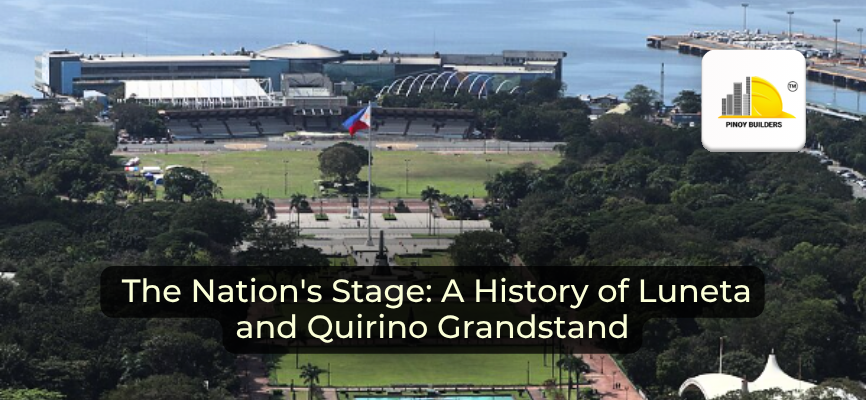MANILA — For generations, Manila’s historic civic heart—Luneta Park and the Quirino Grandstand—has served as the Philippines’ most significant stage. They are the twin venues for the nation’s turning points, from formal state ceremonies and massive faith-based gatherings to powerful political moments. Their shared story is a map of Manila’s own evolution, from a colonial promenade to a modern, shared ground for national expression.
Built for the Nation
The Grandstand itself was born from a moment of national definition. Erected in 1949 for the first post-war Independence Day celebrations on July 4, it was purpose-built to host the nation’s formal rites.
It quickly became the fixed setting for one of the republic’s most important rituals: the presidential inauguration. Beginning with its namesake, Elpidio Quirino, the grandstand has hosted the inaugurations of numerous leaders, including Ramon Magsaysay, Ferdinand Marcos, and Benigno Aquino III, where they formally take their oath of office before the people.
Adjacent to this formal stage lies the area’s historic soul: Luneta. Its origins trace back to the Spanish period’s Paseo de la Luneta, a social meeting ground for the city’s residents. This park was fundamentally reshaped during the American period under a new city plan, which introduced the sprawling lawns and grand public buildings that frame it today.
A Ground for Millions

The open grounds have a long history of testing the definition of “massive crowd.” In 2015, the concluding Mass of Pope Francis drew an estimated six million faithful, making it one of the largest Papal gatherings in history. This event followed the precedent set in 1995, when Pope John Paul II held the closing Mass for World Youth Day in the same spot, drawing a crowd of over four million that was, for its time, a world record.
But the grounds have hosted more than religious gatherings. In February 1986, it was the site of the massive “Tagumpay ng Bayan” (People’s Victory) rally, a pivotal moment of protest during the People Power Revolution that would lead to a change in government.
In a somber contrast, the grandstand was also the site of the 2010 Manila hostage crisis. This tragedy unfolded live on television and is now etched into the location’s complex memory.
What These Spaces Carry Forward
Today, these grounds remain as active as ever. Far from being just historical relics, they are consistent settings for national rituals, cultural programs, and public discourse.
Plans are already underway to enhance the area for future generations. These proposals include the development of green-roofed structures, improved visitor stations, first-aid facilities, food stalls, and dedicated security posts. The entire western section of Rizal Park, which includes the Grandstand, is also slated to become an integrated zone for tourism and learning, ensuring that the nation’s stage is preserved and prepared for the next chapter of Philippine history.
Sources:
https://nhcp.gov.ph/news_and_updates/rizal-park-luneta-through-the-years/
https://en.wikipedia.org/wiki/Quirino_Grandstand
https://ppp.gov.ph/wp-content/uploads/2022/05/PROJ_Rizal-Park-WesternSection-Briefer.pdf










